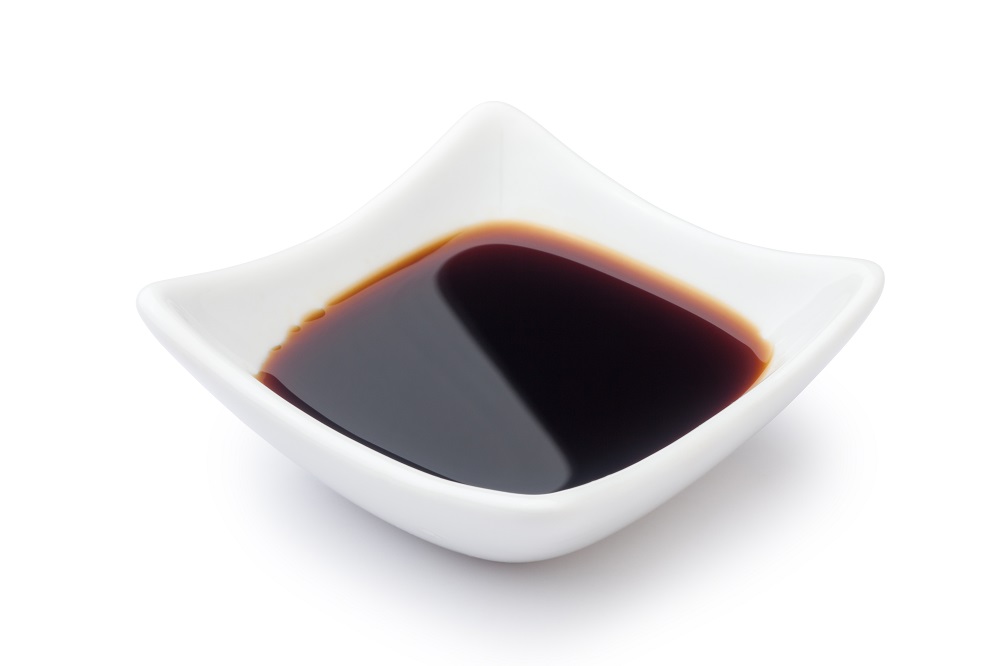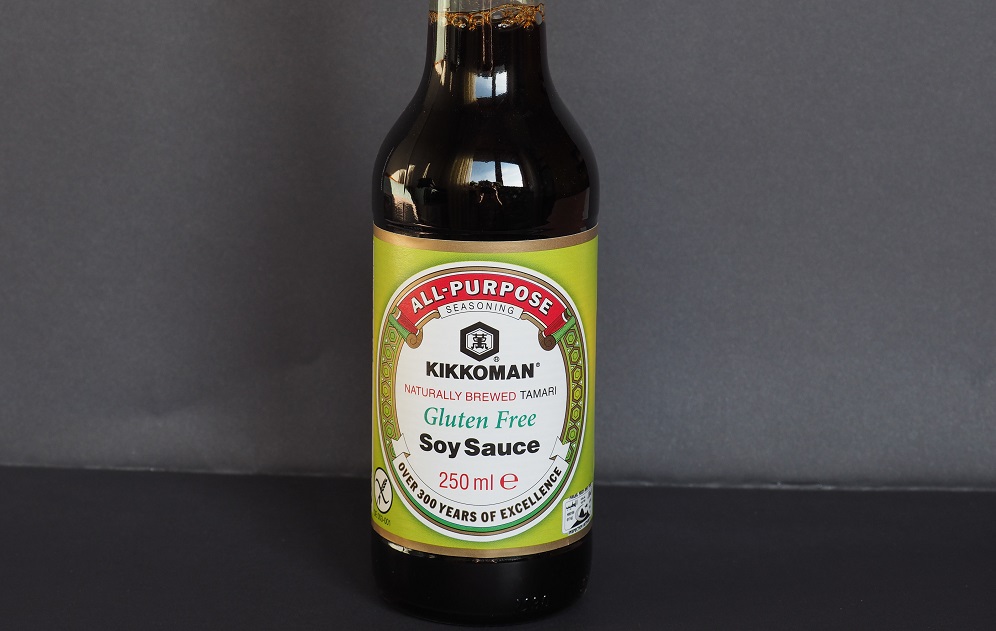Soy sauce is one of the most well-known products of soybean and a prominent component in many different cuisines, especially in East and Southeast Asia. Prepared from natural ingredients such as soybeans, soy sauce is heavily used both as a condiment and as a salty seasoning.
Soy sauce is considered to be perfectly suitable for vegan diets as the principal ingredient of soy sauce is simply soybeans. Produced by fermenting soybeans with a combination of wheat, water, and salt, the fermentation proceeds with the aid of various microorganisms.

While soy sauce reached the Western hemisphere around the 1600s through trade between the Dutch and the Japanese (i.e., through the Dutch East India Company), soy sauce already had an extensive history in Asia dating back to the Western Han Dynasty, 2,200 years ago (6).
Interestingly, the word ‘soy’ comes from the Japanese term ‘shoyu’ that refers to soy sauce. This means that the soy plant (Glycine max) and the soybean derive their name from the sauce made from them and not the other way around.
Depending on the ingredients and the preparation methods, different types of soy sauce have been developed in different parts of Asia. Two common types of soy sauce primarily used in various Asian cuisines are light and dark soy sauce.
Aside from the difference in their color, light soy sauce is distinct from dark soy sauce in terms of flavor and usage. A much thicker liquid, dark soy sauce is left to ferment much longer than light soy sauce. Furthermore, dark soy sauce is often added with sugar or molasses which gives it its sweeter flavor.
Soy sauce can also be differentiated by how it is prepared. Traditionally, soy sauce is fermented and left to age for months and even years. However, modern industrial techniques have allowed the production of soy sauce to take place in days with the use of hydrolyzed soy protein or hydrolyzed vegetable protein.
Industrially, soy sauce production consists of three major steps: Koji production, brine fermentation, and refinement.
The Koji production involves the soaking of soybeans in water to produce the necessary enzymes to produce the sugars that will serve as the nutrients for the microorganisms in the fermentation process that will take place in brine fermentation. The result from brine fermentation then undergoes refinement which involves pressing, filtration, pasteurization, and packaging (4).
Different cultures also have slight variations on soy sauce. For example, Japanese soy sauce tends to be prepared with roasted wheat. On the other hand, Chinese soy sauce used to be traditionally prepared without wheat but is nowadays prepared with wheat flour.
Despite having many different varieties available, soy sauce is mostly vegan as it is primarily made of fermented soybeans. Different ingredients can be added to develop different flavor profiles of soy sauce such as salt, sugar, wheat, and water, but they are also mostly vegan ingredients as well.
Dark soy sauce, a common type of soy sauce used for its strong soy flavor is commonly used in many cuisines. However, some people might be wary because this type of soy sauce is made with sugar.
Many vegans have learned to be wary of sugar because although sugar is made from a plant source (i.e., sugar cane), it can be non-vegan depending on how it was produced.
In order to make sugar appear ideal to many people, sugar is refined and processed to become finer and white. This process includes a filtering process which becomes the source of the problem.
While some sugar manufacturers use vegan components for filtering such as granulated carbon, other manufacturers use bone char - the ground and charred bones of animals. Sugar processed using bone char is not vegan since its production requires the use of animal products (3).
Fortunately, this practice is more common in the US than it is in other countries. Since soy sauce is mostly produced in Asian countries, the chances of sugar being processed with bone char is relatively low.

Despite being made of all vegan ingredients, the vegan community protested against the Kikkoman Corporation, a Japanese food manufacturer that primarily dealt with soy sauce and other associated products.
Generally considered the most popular soy sauce company in the US, an aggressive PETA (People for the Ethical Treatment of Animals) campaign attacked the company. Including 100,000 protest emails, the campaign was successful in forcing the Kikkoman Corporation to halt its animal testing (2).
The campaign began after the company released studies documenting its various methods for safety testing which involved the use of animal models in 2015. The methods used included force-feeding rats with fermented soy milk, inducing heart disease in rabbits through high-calorie diets, and such.
As a response to the overwhelming community reaction, the Kikkoman Corporation published a new policy that aimed to reduce unethical animal treatments. A post on their website says:
“Now, Kikkoman is committed to non-animal approaches to test the safety of our products when we use biological methods. Kikkoman is introducing and developing non-animal testing methods and conducts no animal testing across any of its product lines (1).”
However, the same post mentions that the company still has to follow regulations imposed by the government or food safety authorities that might include animal testing.
While soy sauce is suitable for vegan diets, the condiment has been suggested to be used in moderation due to some health concerns associated with it.
Firstly, soy sauce contains a high amount of sodium which has been associated with increased risk for certain adverse health effects such as high blood pressure, heart disease, and stroke (7).
Soy sauce is also not suitable for people with strict restrictions against gluten. Since soy sauce production involves wheat, then soy sauce is not gluten-free. This is especially important for people with celiac disease as gluten can trigger immune responses in the small intestine and eventually damage the intestinal lining (8).
Many chemically produced soy sauces also contain MSG (monosodium glutamate), a flavor enhancer commonly used in Asian cuisine. While the ingredient remains controversial to many individuals, many studies have already established the safety of MSG, and food safety authorities such as the FDA have approved it for public consumption.
References
5. https://books.google.com.ph/
6. https://www.hsph.harvard.edu/
